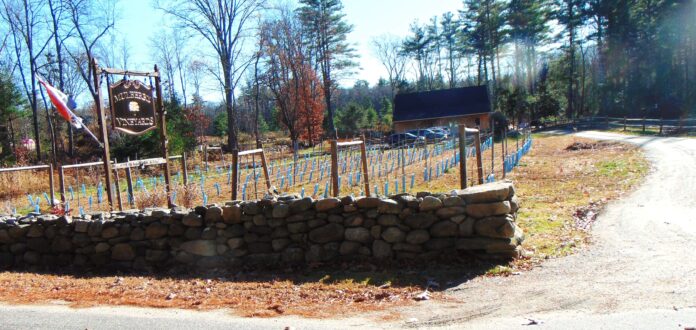GLOCESTER – Everyone seems to agree that Mulberry Vineyards is a nice little winery. The neighbors in the residentially zoned location say they want it to stay that way.
When Mulberry Vineyards owner David Wright’s request for an entertainment license came before the Town Council at a recent meeting, neighbors were once again up in arms. Previously, neighbors complained when Wright applied for a special permit to hold weddings, which was denied earlier this year.
Resident Kevin Lavoie told the council that all the other establishments in town that had entertainment licenses were, basically, barrooms open seven days a week.
“You’re pretty much setting up a full-time barroom operation over there by allowing this,” he said.
Others agreed.

“We’re going to have a bar in our neighborhood,” David Colantonio told the council.
He added that other bars were in areas zoned for bars and entertainment. This, however, is a residental/agricultural zone, he said, a nice, quiet neighborhood.
“I’m sure that part of the appeal for his guests that want a drink and listen to music is that they are in a quiet, residential neighborhood,” said Colantonio. “They’re not on a busy street, they’re not on a main road. They’re getting the benefit of our quiet neighborhood while disturbing us.”
Colantanio also questioned whether they were licensed, as a winery, to sell beer, which he said they were doing, along with out-of-state wine. He questioned how they could even be called a winery, since there are no vineyards on the property.
“They haven’t grown a single grape in all those years they have been there,” he said. “They don’t grow anything. They don’t raise anything.”
Others questioned changes that had taken place at the vineyard, including enlarging the parking area to allow 209 vehicles, and constructing a new large barn on the premises.
“We have no idea what he intends to do,” said Robert Rogers, a nearby resident. “This is supposed to be a winery. A winery, to me is, he sells wine that he grows. What does he need all these licenses for?”
Wright explained that he was applying for an entertainment license to allow him to have indoor entertainment.
“When we do have music indoors, it will probably be a guy with a guitar,” he told the council. “We’re not large enough to have a band or something like that.”
Ed Gendron, however, questioned the recent addition of a large barn on the premises. When told that the barn was intended for dry storage, Gendron questioned whether it could be used for entertainment purposes.
“Does that include a band being in there playing?” asked Gendron. “That’s what he’s going to use that for. He’s been lying to you.”
Wright assured the council that the barn was for dry storage.
“I just need a place to store dry goods, to store my farm equipment,” he told the council.
Wright added that in order to process grapes in the future, he needed more room for equipment to do so. He also espoused the advantages of having the winery in the town, bringing outsiders in to shop and take advantage of what the town has to offer. The winery, he said, actually draws visitors to the town, as well as new residents.
“It’s all that traffic going into a residential area that they don’t like,” responded Councilor Jonathan Burlingame.
Wright said he has made efforts to assuage neighbors, including moving the stage at the winery for more privacy and less noise, enlarging the parking lot and hiring more people.
“I think things are going wonderful,” he said. “We’ve actually been in business for ten years.”
“I have a neighbor who owns ten acres near me,” Burlingame told Wright. “I wouldn’t want him to put a winery back there and have cars coming in all the time. If you’re zoned for commercial, that’s a different story.”
Councilor Cheryl Greathouse questioned the future use of the new barn.
“You have no intention of using this barn for entertainment in the future?” she asked Wright.
“Not at this time,” he responded, which brought a collective reaction from those in attendance.
“It’s a very expensive barn for storage,” said Greathouse.
When Greathouse asked where the indoor entertainment would take place, Wright said it would be in the current tasting room, which is about 40 feet by 40 feet. Councilor Walter Steere said he had been there and suggested it could hold maybe 30-40 people. When asked what the official capacity of the room was, according to the fire marshal, Wright said he didn’t know.
“To be fair,” said Steere, “All the establishments in town have limits for the number of people that can be accommodated.”
Rogers questioned what would happen if an event was held outside, and it rained. Where would all those people go, he asked, noting that they won’t fit in the tasting room.
“There is something fishy going on here,” he said.
Gendron suggested that if the license were granted, it should include a stipulation that the barn could not be used for entertainment purposes. He also expressed concerns about time limits for events.
“It’s a very nice looking building,” Gendron told the council. “I’ve never seen a barn so nice. If I were going to have a special event, that would be a nice place to go into.”
When Steere proposed granting the license with the stipulation that only the tasting room could be used for indoor entertainment, it was defeated 4-1.
Burlingame then made a motion to deny the license, which passed 4-1 with Steere opposed.
When Mulberry Vineyards subsequently requested special event licensing there was more controversy and questions. Wright requested a license for 37 events, including 14 music events, eight farm markets, ten weddings and five festivals. Last year, 29 events were requested with 19 granted. Only eight live music events were held.
Neighbors were particularly concerned about weddings and the use of the property as a venue, rather than a vineyard. When Worthy asked Wright if the business would fail if he just sold wine, Wright said it would.
“They are operating a major event venue, masquerading as a winery,” Lavoie told the council. “Having a winery doesn’t give them the right to have events.”
The newly built barn was once again brought into question.
“You don’t build something like that to store farm equipment,” said Lavoie.
Others voiced their opposition to allowing any weddings on the premises. Special permits for weddings had been denied in the past.
“It’s not a place for a wedding,” Gendron told the council. “What are you going to do if it rains? It is one thing if you have an event, and it rains. But, if you have a wedding, what are you going to do? You going to go in that little shed? You can’t move that date.”
Wright argued that in order for farms to survive, they have to have special events like hayrides and corn mazes to produce extra income. He added that 445 people signed a petition earlier this year to allow the vineyard to hold events.
“You have to do these things today in order to survive,” he said.
“Having a winery doesn’t give him the right to have an event,” argued Lavoie. “The town has no obligation to grant these events too.”
Lavoie again questioned the future use of the barn, adding that it is a beautiful barn.
“Anybody who thinks there is not another use intended for that down the road will probably be sitting waiting for Santa Claus in a few weeks,” he added. “You don’t build something like that for the sole use of storing farm equipment.”
“It’s clear what he wants,” said Colantonio. “He wants a wedding event, music, special events venue. That’s what he does. Of course he couldn’t survive just making wine because they don’t grow any grapes, and they don’t make wine. They are trying to circumvent the zoning laws.”
He added that in the past Wright had told the council that they were going to plant five acres of grapes. None have been planted, he said.
“If they want to grow grapes and make wine and follow the law, that’s fine,” he added. “Grapes don’t need music to grow.”
Wright argued that he did not have the building storage to process grapes yet. Holding events helped generate the funds to do so, including the new barn.
“I think the issue is bigger than the entertainment licenses,” said Worthy.
He suggested that part of the issue involves proper zoning and that Wright should approach the Zoning Board for answers and possible solutions, perhaps including changing the zoning for the vineyard property, as well as clearing licenses by the state to sell alcohol that comes from out of state.
“You need to clear your name, say everything’s fine…we’re not a liquor board up here,” said Worthy. “I think you guys really need to start over and go to the planning and zoning boards and make your stand, and everybody has to follow that.”
Greathouse subsequently made a motion to not allow any live music at the venue. It did not receive a second.
Burlingame suggested approving the same events allowed with the previous license. After more discussion, the council approved a license for eight live music events, eight farm markets and three festivals with no music.









Gotta love how this guy calls his place a winery. You grow grapes and make them into wine at a winery. This guy grows nothing, and makes wine from imported grapes. Nice try, but no cigar. He is full of….